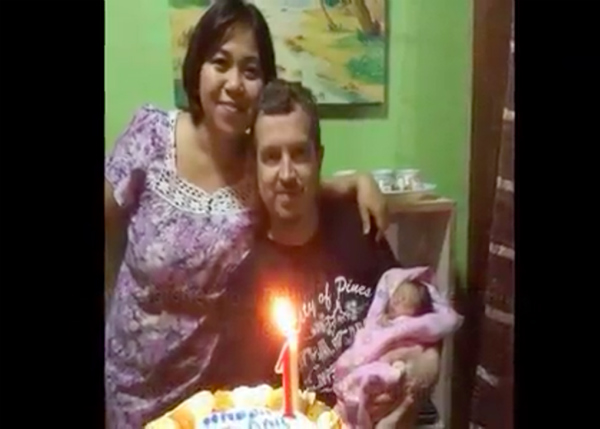Cannabis wasn’t their first choice.
Doctors in the Philippines prescribed Valium to calm her down. They also tried Rivotril, a sedative that slows down the activity of the brain. Everything going into her frail body damaged her liver and left her weak. At 21 months old, Rhythm Star Adams would often spend an entire day sleeping.
“I used to start my days with fear,” recalled Rhythm’s mother, Jen.
She was just seven months old when she began having the seizures, as many as 100 a day, the result of infant epilepsy. The attacks came first thing in the morning, and Rhythm required constant oversight and care throughout the day.
Jen’s indefatigable spirit led her to look for solutions beyond what the doctors offered. She wanted to stop giving her daughter “Band-Aid solutions.”

”Jen did a lot of research. She was in touch with what was working. She was not afraid. Her instincts were always right,” said Patrick, her American husband.
Earlier this year, Rhythm and her parents moved to the United States, where there is legal access to CBD (cannabidiol) oil, a component of cannabis that doesn’t leave the user feeling “high” or stoned. It is said to be effective in the treatment of childhood epilepsy, and can be bought online for only USD150.
It changed their lives.
About a week after Rhythm’s first dose, her mood noticeably improved and she began smiling more. The seizures slowly dissipated and she has been seizure-free for two months now. Jen and Patrick finally got the chance to savor the simple joys of parenthood, such as seeing their daughter’s reaction to bitter food.
“There’s a certain image that comes to people’s mind when talking about cannabis… smokers, stoners. Growing up we are told that weed is bad, but we just have to be more open,” said Patrick.
But while Rhythm’s improvement have given her parents rightful cause for hope, for Filipinos back home, the battle for safe access to marijuana for patients with conditions such as cancer and epilepsy is just beginning
If the battle has a starting point, many would point to September 2013 and the death of 2-year-old Moon Jaden Yutuc. Her death from Dravet Syndrome, a catastrophic form of infant epilepsy that had led her parents to publicly seek out medical marijuana, opened a nationwide discussion on the urgency of legalization.
More and more “cannahopefuls”, as they dubbed themselves, came out in the wake of Moon’s death, bonding together on social media to fight for a common cause.
Their Facebook group has evolved to become the Philippine Cannabis Compassion Society (PCCS), which is now on the front lines of the fight for the legalization of medical marijuana in the country. PCCS only has about 200 active members, mostly conservative parents, but they are tirelessly fighting for medical cannabis.
“We want to have a good framework in order for this to work for us. We want to give the patients the option to use marijuana as medicine,” said PCCS founder Kimmi del Prado.
Lawmakers are now discussing the proposed Philippine Compassionate Medical Cannabis Act (House Bill 180), which was re-filed in July by Rep. Rodito Albano after timing issues saw the first attempt at legislation scrapped a month earlier. This time, a technical working group has been formed to scrutinize and hammer out the provisions of the bill. Clinical trials and testings are expected to follow soon.
If approved, the law will allow people who suffer from certain conditions to have safe access without the risk of being charged with possession.

Cancer and epilepsy patients have played a huge personal role in the fight. In spite of their weakened bodies, they’ve acted as lobbyists, knocking on the doors of “conservative” congressmen to help them see the urgency of their situation.
“It helps if lawmakers see the recipients. They need to see faces,” Del Prado said.
Although Del Prado has no immediate relatives who needs medical marijuana, she has embraced the fight and made it her own in recent years since first researching the topic.
“I am not being paid for any of this,” she said jokingly. She added that in PPCS, they have an unspoken agreement that their currency is gratitude.
While they rarely meet, PCCS is like family, Del Prado said. When they do meet, it’s not uncommon for members to shed tears as they share their personal and deeply emotional struggles.

The biggest challenge for PCCS is breaking the cultural belief that marijuana is bad, a stigma Del Prado said influential personalities like celebrities and politicians can help eliminate.
But while few local celebrities have taken up the cause to date, one outsized voice on the national stage has spoken up on behalf of medical marijuana multiple times now.
Despite President Rodrigo Duterte’s high-profile war on drugs, which has garnered international condemnation even as it maintains broad support in the Philippines, the group sees him as an ally.
The tough-talking president has now said he supports the legalization of medical marijuana in the Philippines no fewer than three times on national television.
With that kind of public support from the executive, PCCS remains optimistic that patients who need it will have safe access to it before the end of Duterte’s term in 2021.
Rhythm’s parents remain optimistic, too. They believe that Rhythm’s condition will get better over time. Patrick even wrote “The World of Rhythm,” an inspiring children’s book about how Rhythm would someday captivate the world with her musical talents.
As a testament to her ferocious positivity, Jen has already bought shoes for Rhythm, even if she doesn’t know when she will actually have the ability to walk.
She advises other cannahopefuls to stay positive, too.
“There was a time when doctors were telling me that Rhythm will not make it because she was a premature baby. But I still went shopping for her crib and clothes. If you want something, you claim it and show that you’re prepared,” Jen said.




